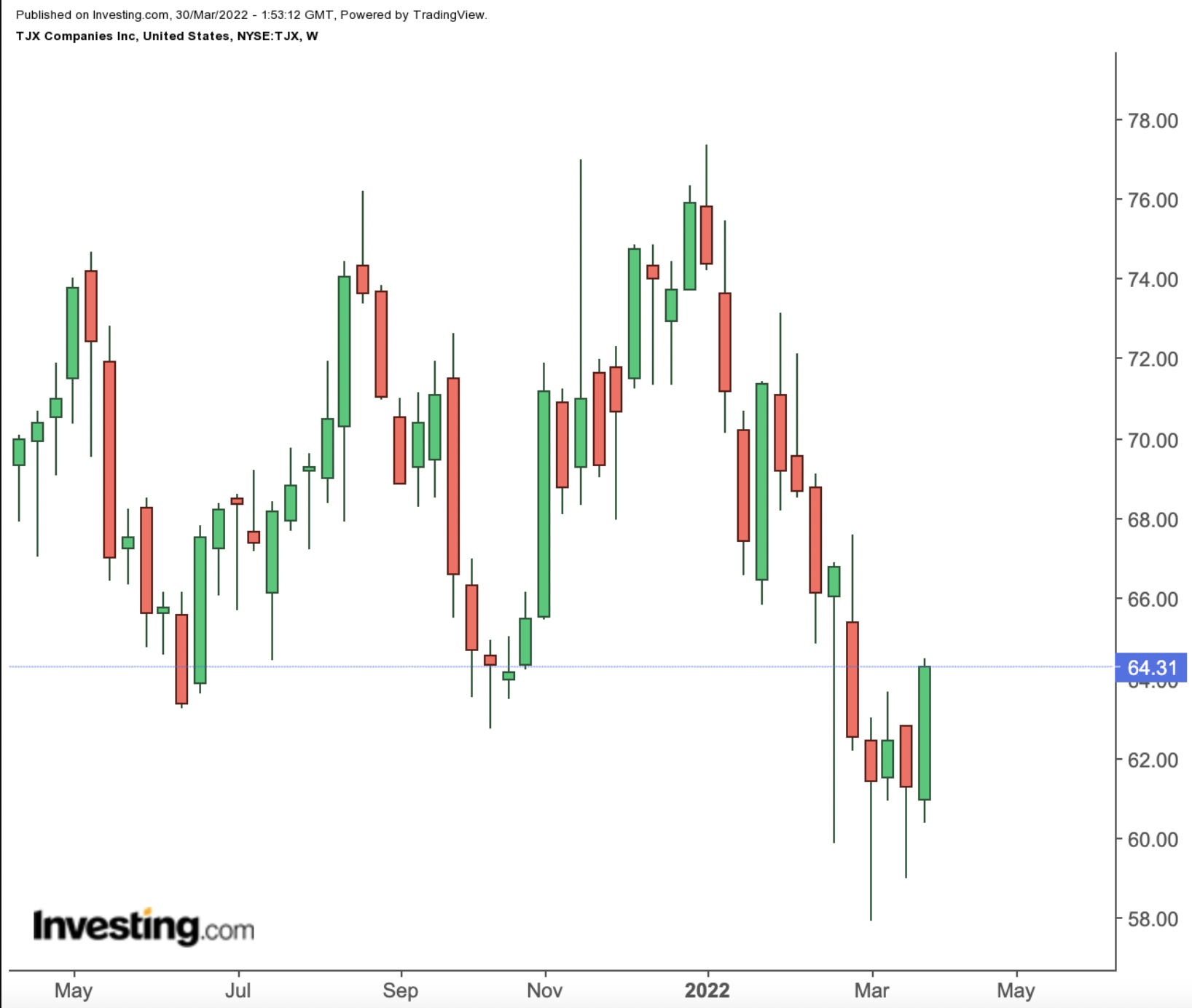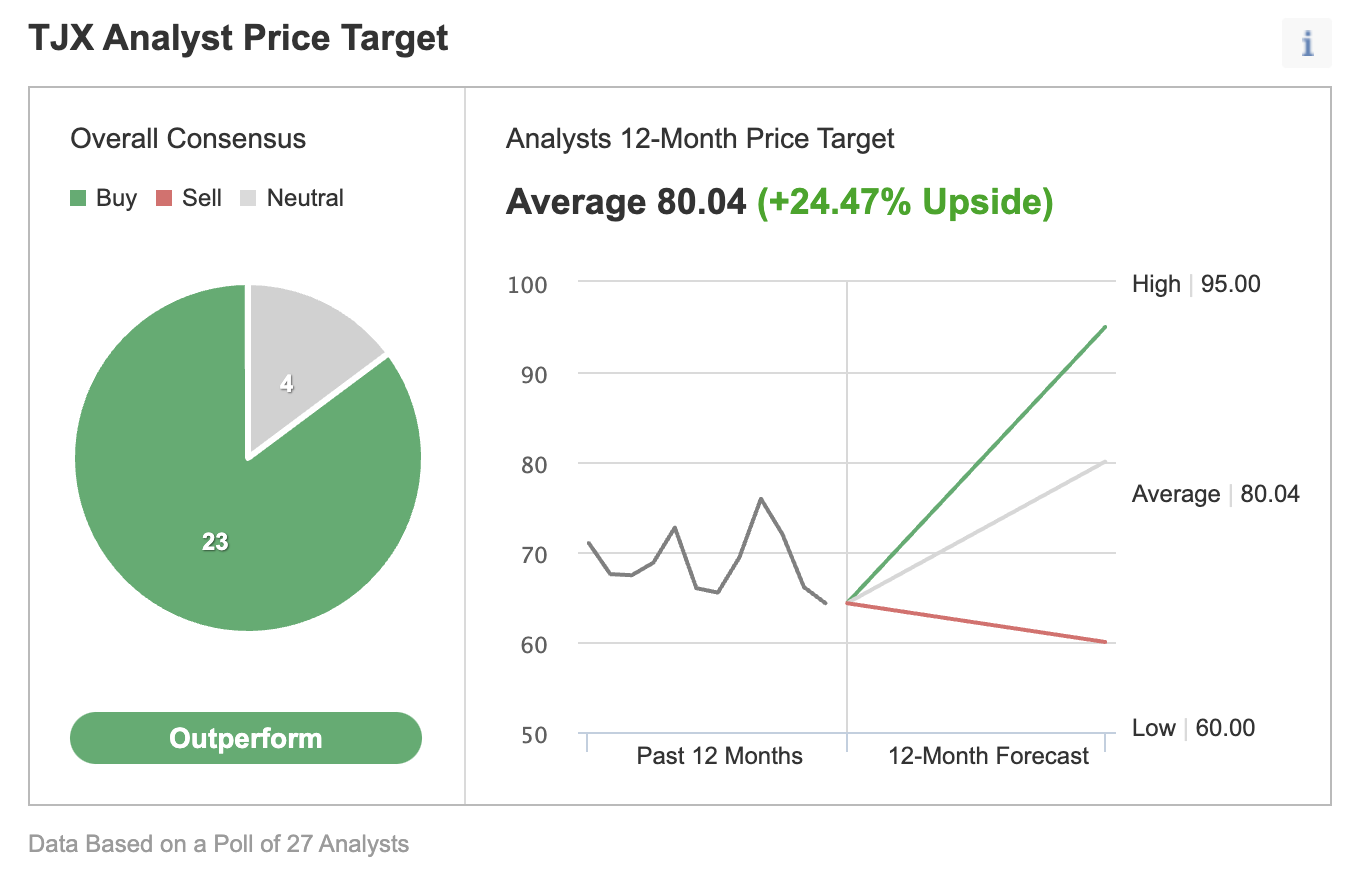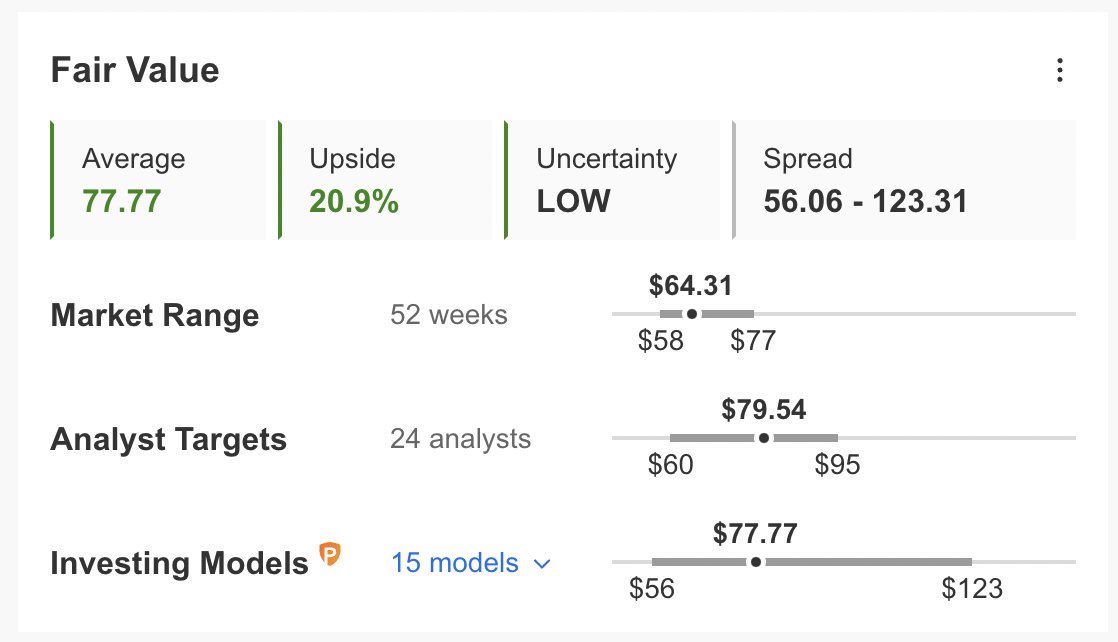Pilgrim Global buys Sable Offshore (SOC) shares worth $14.7m
- Leading discount apparel and home fashions retailer TJX stock is down more than 16.5% since the beginning of 2022
- Rise in wages and freight costs have meant headwinds for TJX shares
- Long-term investors could consider buying the dips in TJX stock
Shareholders in retailer TJX (NYSE:TJX) have seen the value of their investment drop close to 5% over the past 52 weeks and 16.7% so far this year. By comparison, the Dow Jones US Retail Index is up 7.2% in the past 12 months, but down 7.1% year-to-date.

Meanwhile, two other off-price retailer stocks—Ross Stores (NASDAQ:ROST) and Burlington Stores (NYSE:BURL)— are down 16.9% and 33.1% respectively since the beginning of this year.
On Jan. 4, TJX shares went over $77, hitting a record high. However, on Mar. 8, the stock saw a 52-week low of $57.92, dropping more than 24% in about two months.
As we write on Tuesday, intraday, shares are changing hands at $63.20. The stock’s 52-week range has been $57.92-$77.35, while the market capitalization currently stands at $75.4 billion.
How Recent Metrics Came In
TJX is a prominent off-price apparel and home fashions retailer whose well-known retail outlet brands include Marshalls, T.J.Maxx/TK Maxx, HomeGoods, Sierra, and Winners. It has more than 4,500 stores worldwide.
Around a quarter of US consumers shop at T.J.Maxx stores. Meanwhile, close to 10% of shoppers visit a T.J.Maxx store for most of their holiday shopping. Therefore, Wall Street pays close attention to the performance of TJX shares.
Management released Q4 FY22 figures on Feb. 23. The retailer reported $13.9 billion in revenue, implying a 27% increase year-over-year. Net profit for the quarter was $940.2 million or 78 cents per diluted share. A year ago, it had been 81 cents per share.
On the results, CEO Ernie Herrman said:
“For the fourth quarter, we saw a 13% open-only comp sales increase for the U.S... Fourth quarter sales were trending higher before the surges in Omicron.”
Management now expects Q1 FY23 diluted EPS to be in the range of 58-61 cents, compared with 44 cents in the previous year.
Prior to the release of the quarterly results, TJX stock was around $62.50. Now, at $63.20 intraday, the current price supports a dividend yield of around 1.60%.
Next Move In TJX Stock?
Among 27 analysts polled via Investing.com, TJX shares received an “outperform” rating, with an average 12-month price target of $80.04. Such a move would imply an increase of well over 26% from the current level. The target range is between $60 and $95.

Source: Investing.com
Similarly, according to a number of valuation models like those that might consider P/E or P/S multiples or terminal values, the average fair value for TJX Companies stock on InvestingPro stands at $77.77.

Source: InvestingPro
Readers who watch technical charts might be interested to know that a number of TJX’s intermediate- and long-term oscillators are oversold. Although they can stay extended for weeks—if not months—the decline in price could also be coming to an end.
Our expectation is for TJX to continue to find strong support at the $60 level. Although it might initially dip below it, shares are likely to bounce back before too long. Afterward, TJX stock would likely trade sideways, possibly between $60 and $65 while it establishes a new base.
Cash-Secured Puts On TJX
Price Intraday: $63.20
Investors who are not concerned with daily price moves, and who believe in the long-term potential of the company, could consider investing in TJX stock now. They could expect the shares to make a move toward $77.77, or the fair value estimate given by various models.
Those who are experienced with options could also consider selling a cash-secured put option in TJX stock—a strategy we regularly cover. As it involves options, this setup will not be appropriate for all investors.
Such a bullish trade could especially appeal to those who want to receive premiums (from put selling) or to possibly own TJX shares for less than their current market price.
A put option contract on TJX stock is the option to sell 100 shares. Cash-secured means the investor has enough money in his or her brokerage account to purchase the security if the stock price falls and the option is assigned. This cash reserve must remain in the account until the option position is closed, expires, or is assigned, which means ownership has been transferred.
Let's assume an investor wants to buy TJX stock but does not want to pay the $63.20 per share price at the time of writing. Instead, the investor would prefer to buy the shares at a discount within the next several months.
One possibility would be to wait for TJX stock to fall further, which it might or might not do. The other possibility is to sell one contract of a cash-secured TJX put option.
So, the trader would typically write an at-the-money (ATM) or an out-of-the-money (OTM) put option and simultaneously set aside enough cash to buy 100 shares of the stock.
Let's assume the trader is putting in this trade until the option expiry date of July 15, 2022. As the stock is $63.20 at the time of writing, an OTM put option would have a strike of $60.
So, the seller would have to buy 100 shares of TJX at the strike of $60 if the option buyer were to exercise the option to assign it to the seller.
The TJX July 15 60-strike put option is currently offered at a price (or premium) of $2.70.
An option buyer would have to pay $2.70 X 100, or $270, in premium to the option seller. This premium amount belongs to the option seller no matter what happens in the future. The put option will stop trading on Friday, July 15.
Assuming a trader would enter this cash-secured put option trade at $63.20 now, at expiration on July 15, the maximum return for the seller would be $270, excluding trading commissions and costs.
The seller's maximum gain is this premium amount if TJX stock closes above the strike price of $60. Should that happen, the option expires worthless.
If the put option is in the money (meaning the market price of TJX stock is lower than the strike price of $60) any time before or at expiration on July 15, this put option can be assigned. The seller would then be obligated to buy 100 shares of TJX stock at the put option's strike price of $60 (i.e. at a total of $6,000).
The break-even point for our example is the strike price ($60) less the option premium received ($2.70), i.e., $57.30. This is the price at which the seller would start to incur a loss.
Cash-secured put selling is a moderately more conservative strategy than buying shares of a company outright at the current market price. This can be a way to capitalize on the likely choppiness in TJX Companies' stock in the coming weeks.
Investors who end up owning TJX shares as a result of selling puts could consider setting up covered calls to increase the potential returns on their shares. Thus, selling cash-secured puts could be regarded as the first step in stock ownership.
